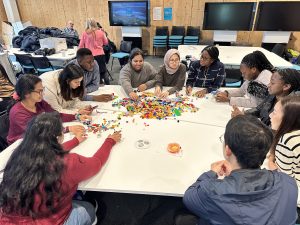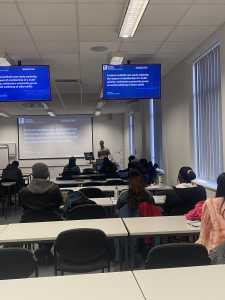
Race Equality in Practice: A case study in decolonising the public health curriculum
January 24th, 2024
In 2021, a team of ten postgraduate public health and global health students led a full curriculum review exploring the equality, diversity, inclusivity and decolonisation of the postgraduate public health courses at the university.
The content, assignment structure and teaching methods of every module and wider student support and experience, were independently reviewed by three students.
Findings were triangulated through discussion. The students involved were a mix of home and international students and were diverse in terms of demographics and academic background, ensuring that review findings would be representative of wider viewpoints.
The project team communicated with staff and other students through weekly public health team meetings, student feedback sessions and student representative meetings. The team met with the Faculty of Medicine and Health Sciences Black and Minority Ethnic (BAME) Champions to further advance the recommendations.
There were also feedback meetings with the external examiner for the courses to assess recommendations in line with academic standards and quality assurance. Additionally, feedback on the recommendations was collated from alumni through social media networks.
Through this project, findings and recommendations around the courses’ teaching and learning resources, teaching delivery, assessments, and student support were identified, which led to practical changes within our curricular. Changes include:
- The implementation of different learning and assessment formats to accommodate a wider range of students’ abilities, improve engagement in the learning process and enhance graduate employability. For example, our assessments now include the development of a public-facing podcast and working within a group to present a research proposal to a funder.
- Students using Lego to create a health system
- Students using Lego to create a health system
- Reading lists have been expanded to include more research from lower middle-income countries (LMICs), to help students better understand the realities of LMIC lived experience and expose UK-home students to new or additional perspectives.
- Changes to lecture content, including:
– More public health examples from the Global South and LMICs have been incorporated into teaching;
– Presentation slides now include images of a diverse range of individuals, to ensure that students feel more represented and included;
– When teaching health practice and policy, lecturers now include discussion around the contextual barriers faced by under-represented and minority groups that may prevent them from accessing and using health services;
– Examples of how different research methodologies can be applied in local community and global settings are now taught, to ensure that students are confident when going to work in different settings; - More focus has been placed on student-led learning experiences to maximise the perspectives of the diverse student cohort and to encourage greater participation with critical thinking. For example, a weekly student-led journal club has been implemented where students select, present and discuss various Global Health articles or issues of their interest.
Following the success of this project, staff and students have co-created Master of Public Health and Master of Health Psychology toolkits with students to prepare future cohorts for Master study. The toolkits aim to add to existing University resources and services, by:
- Enhancing the preparation of international students for UK assessment and learning styles. For example, by providing information on how to find gaps in the literature, writing academic essays and reports, the importance of referencing correctly, how to handle the pressure of having one assignment determining your grade for a module, and the expectations of UK postgraduate study.
- Further preparing students for life in Nottingham, including a practical guide on how to access NHS services
- Providing tips and advice from past students in the form of short videos, including specific advice for international and mature students
Furthermore, this project has inspired the development of a Critical Analysis of Power and Equity (CAPE) Toolkit for the Master of Public Health curriculum. This toolkit provides resources to enable staff to support students effectively and continue targeting the awarding gap through three themes:
- Theme 1: Acknowledging the political economy of global public health.
- Theme 2: Decolonising and diversifying the curriculum.
- Theme 3: Embedding intersectionalism in the curriculum.
The toolkit is currently being used with the intention of getting feedback from staff and students and refining it for future use.
This case study was shared with us by Sam Crossley (Assistant Professor in Public Health) and Gillian Carleton-Boylan (Assistant Professor in Public Health).
If you want to share a case study yourself, please contact us at BR-EDIcoordinators@nottingham.ac.uk
Tags: bame, Race Equality, Race Equality in practice, REC
Comments are closed.
Other

Need news? See you on SharePoint
After 14 years of service, Campus News is being retired as the university’s staff news platform. […]

Roads and car parks closed for refurbishing work
As part of ongoing road improvements at the university, works will be taking place to resurface […]




